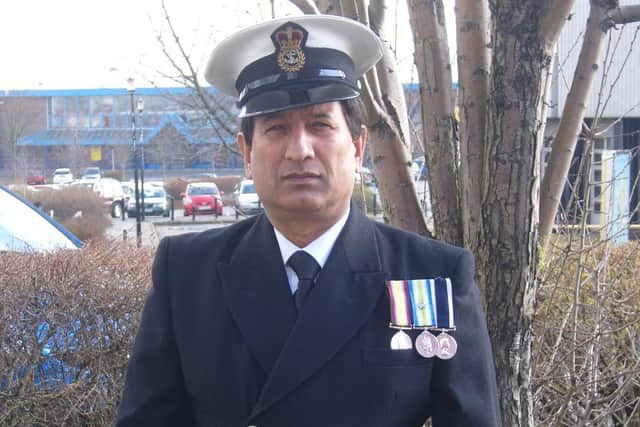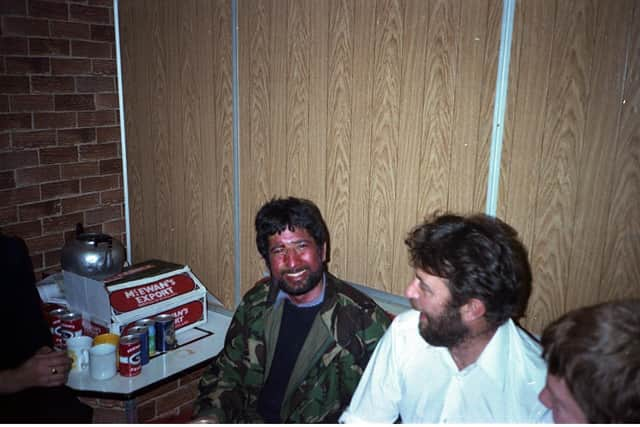Falklands veteran from West Yorkshire suffered in silence for 40 years with PTSD which left him with three failed marriages and estranged from his five adult children
Ever since he left the forces in 1996 due to a back injury, Harry Boota has been short-tempered, withdrawn, has three failed marriages behind him, countless relationships in between and is estranged from his five grown-up children aged between 22 and 38.
Mr Boota, 66, of Bradford, says he is unable to deal with relationships and struggled to adapt to civilian life after his service – notably in the Falklands War.
Advertisement
Hide AdAdvertisement
Hide AdHe says he was “left on the shelf” and it was only three years ago that he tried to seek help. Prior to that, he said he was in denial and didn’t think there was anything wrong with him.


His story comes as a new study looks at why so many people with mental health problems suffer alone without seeking help.
Now, new research shared exclusively with The Yorkshire Post reveals the reasons vary from community to community.
The study by the international non-profit Surgo Ventures, funded partly by the UK government, involved a survey of more than 17,000 people across all parts of the country.


Advertisement
Hide AdAdvertisement
Hide AdReasons for not seeking help varied depending on the towns or cities people lived in.
For instance, concerns about the financial costs of mental illness were more common in the Home Counties, while people in Yorkshire were more likely to dislike opening up about feelings.
In Yorkshire and Humber, 44 per cent met the threshold that warranted further clinical assessment for depression or anxiety.
Local figures for this were 42 per cent for South Yorkshire and Bassetlaw ICS, 44 per cent for Humber, Coast and Vale ICS, 45 per cent for West Yorkshire and Harrogate (Health and Care Partnership) – both of which are above the national average. For all organisations “Dislike of talking about my feelings, emotions or thoughts” were cited as the main reason why people were discouraged from seeking help.
Advertisement
Hide AdAdvertisement
Hide AdThis rings true with Mr Boota, who says to most of his friends he is “happy Harry” with only very few people knowing how much pain he is in – both mentally and physically.
He injured his back during service and has been on painkillers for the last 26 years, which he says exacerbated his mental health struggles that had gone unaddressed until a friend, who had also served in the Falklands, told him about the PTSD Resolution charity.
He said: “I did not know there was something wrong with me. For the last 40 years I shut it all down. I was in denial, I tried to be normal – it was only when a doctor put a label on it.
“If help had been there 40 years ago it would have saved my first marriage, I still look at my first wife and miss her. She was beautiful, everything a man could ask for and I just walked away from her.
Advertisement
Hide AdAdvertisement
Hide Ad“Remembrance Sunday is a breakdown, you are withdrawn, I try and go out but I can’t confide in too many friends because they don’t understand.”
However, he says while counselling does not make the problems go away it is “helping somewhat” to give him the tools to manage and cope.
Surgo Ventures’ CEO and co-founder, Dr Sema K Sgaier, said: “The fact that one in five people would suffer silently with mental health difficulties is a shocking reflection of barriers to mental health care in the UK.
“What also stood out was how widely the reasons varied from community to community. Health leaders who want to encourage people to seek care will need to pursue tailored, hyper-local strategies for it to work. And our data can help provide these leaders with a roadmap on what to do in their communities.”
Advertisement
Hide AdAdvertisement
Hide AdA spokesperson for the Department for Health and Social Care said: “We will be launching a national conversation to inform the development of a new long term Mental Health Strategy later this year.
“This kind of research will help inform what actions we should take to ensure people who need support can, and do, access it. Mental health services are there for those who need them, so if you need support or are concerned about someone else, please reach out for help.”
Comment Guidelines
National World encourages reader discussion on our stories. User feedback, insights and back-and-forth exchanges add a rich layer of context to reporting. Please review our Community Guidelines before commenting.
